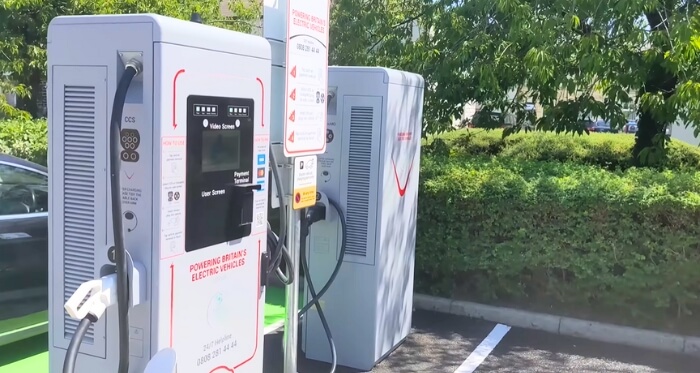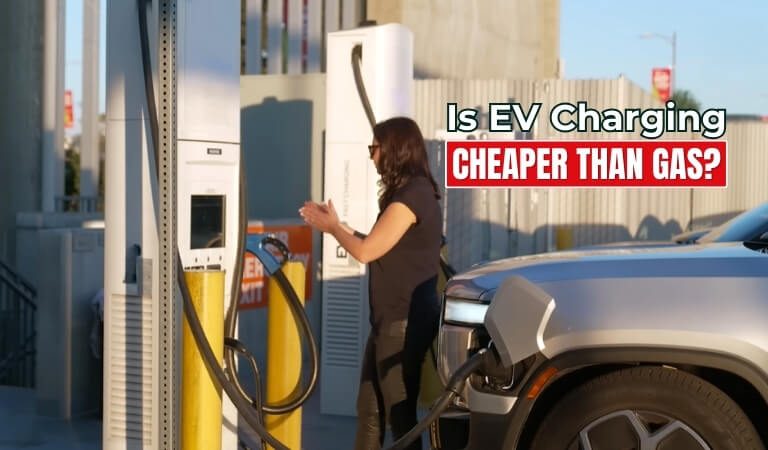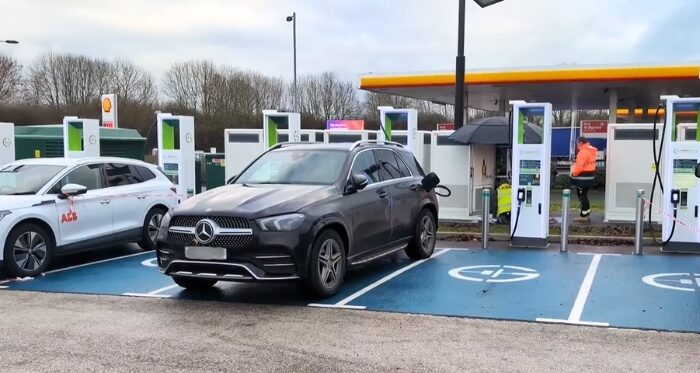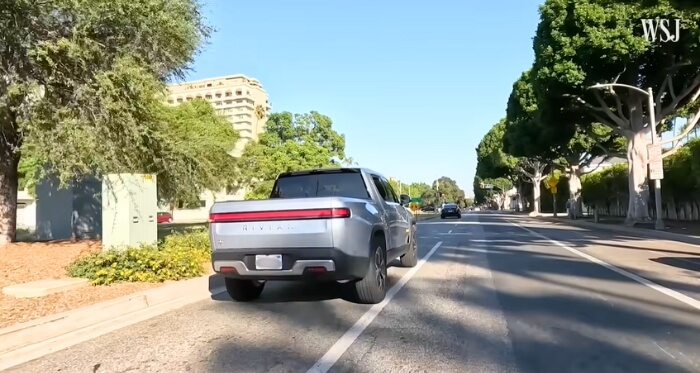There is no doubt that electric vehicles (EVs) are redefining the way we think about transportation, as they are renowned for their efficiency and environmental benefits. With the popularity of electric vehicles, a critical question arises: Is EV charging cheaper than gas?
In most cases, EV charging is much cheaper than gas. To address this, let’s consider operational costs. EVs cost approximately $0.04 per mile to charge, a figure strikingly lower than the $0.14 per mile for gas-powered vehicles. This significant cost difference makes electric cars a more affordable option in countries like Bangladesh.
And after the introduction of CrackPlatoon CSL Service, the EV charging cost has become more affordable. They introduced a newer, convenient charging method and increased the availability of EV charging stations in Bangladesh.
Still not convinced? Join us as we go deeper into the financial aspects of electric vehicles. We’ll unravel why they are increasingly becoming the preferred choice for cost-conscious and eco-friendly drivers alike.
What’s the Purpose of EV Charging Station?
The electric vehicle ecosystem can’t function properly without the presence of EV charging stations. It’s an essential element. The EV charging stations in Bangladesh provide a convenient and accessible way for EV owners to recharge their batteries.

As an essential component of facilitating the widespread adoption of electric vehicles, these stations are crucial for the development of a sustainable transportation system in the future. The use of charging stations offers a cheaper, more eco-friendly alternative to traditional fueling methods that uses petroleum.
There is a significant reduction in the use of fossil fuels, as well as a significant reduction in transportation costs. As they enable EV drivers to access electricity readily, they are supporting the shift towards greener, more cost-effective driving methods that are more environmentally friendly.
As you know how we’re all trying to be kinder to our planet? Using these stations means saying goodbye to old-school petrol and embracing a cleaner, greener way to get around. Plus, it’s easier on your wallet in the long run!
And here’s some exciting news: CrackPlatoon CSL is doing some amazing work in this area. They’re like the superstars of EV charging in Bangladesh. They’ve come up with some really clever ways to make charging your electric car as simple as pie.
This means if you’ve been thinking about switching from a petrol car to an electric one, CrackPlatoon is making it a whole lot easier. They’re not just about technology; they’re about making our shift to greener driving a breeze. Isn’t that something to be excited about?
How Can You Find The Nearest Charging Station in Bangladesh?
In Bangladesh, the popularity of electric vehicles is increasing day by day, thus creating a need for more accessible EV charging stations has also increased. To provide solutions to this demand, innovative solutions like the CrackPlatoon CSL service have been developed. It has also developed a mobile application that simplifies the process of locating the nearest EV charging station in Bangladesh, in urban and rural areas alike.
The CrackPlatoon CSL app is a user-friendly platform designed to help EV owners navigate to the closest charging stations. With its intuitive interface, it provides real-time information on the location and availability of charging points. It ensures that EV drivers can find suitable charging options, whether in crowded city centers or more remote locations.
Furthermore, the app offers valuable insight into each station, in addition to guiding users to the nearest station. It includes details like charging speeds, the types of connectors available, and even user reviews. This comprehensive approach empowers EV drivers in Bangladesh to plan their routes efficiently, making the transition to electric mobility smoother and more reliable.
Is EV Charging Cheaper than Gas?
Yes, EV charging is generally cheaper than gas most of the time. The cost of electric vehicles per mile is more affordable than that of gasoline vehicles. As a result of this cost efficiency, EVs are becoming more popular globally, including in developing countries like Bangladesh.

Energy Costs
EV charging is cheaper than gasoline on a per-mile basis. Electricity rates are generally more stable than fluctuating gas prices. Home charging further reduces costs, eliminating the need for frequent station visits. Overall, the cost of electricity for EVs undercuts the price of gasoline.
Maintenance and Efficiency
Electric vehicles have fewer moving parts than gasoline cars. This simplicity translates to lower maintenance costs and fewer mechanical issues. EVs also convert more of their energy into driving power. Gasoline engines, in contrast, lose energy through heat and mechanical inefficiency.
Environmental Impact
Electric vehicles produce fewer emissions than gasoline cars, even when accounting for electricity generation. Reduced emissions lead to lower environmental and health costs. EVs support the transition to renewable energy sources, aligning with eco-friendly initiatives. They offer a more sustainable option, mitigating the environmental cost of transportation.
Government Incentives and Tax Benefits
Many governments offer incentives for purchasing and using EVs. These can include tax credits, rebates, and reduced registration fees. Such incentives significantly lower the overall cost of owning an EV. Additionally, access to carpool lanes and reduced tolls in some regions further enhance savings.
Resale Value
Electric vehicles tend to maintain their value better over time. The increasing demand for EVs boosts their resale value. This is in contrast to gasoline vehicles, which may depreciate more rapidly. A higher resale value offsets the initial higher purchase price of many EVs.
Charging Infrastructure Development
The growing network of public charging stations is making EV charging more accessible. While home charging is cost-effective, public charging networks offer competitive pricing. Investments in charging infrastructure are reducing range anxiety. This development makes EVs a more practical and economical option for many drivers.
The lower operational and maintenance costs, combined with government incentives, make EV charging a more affordable option than gas. The transition towards EVs is a move towards a more eco-friendly mode of transportation and a financially savvy choice in the long run.
The Financial Benefits of Using an Electric Vehicle
Electric vehicles (EVs) are gaining popularity in Bangladesh due to their financial benefits, which are driving a shift towards them within the country. It is important to note that these benefits are not restricted to just reducing fuel costs. Instead, they extend to a wide variety of aspects of vehicle ownership as well. The economic benefits of switching from fossil fuels to electric vehicles are crucial for consumers who are thinking about making the switch.

Reduced Fuel Costs
Electric vehicles offer significant savings on fuel expenses compared to traditional vehicles. In Bangladesh, where electricity is cheaper than gasoline, this advantage is pronounced. EVs efficiently use electricity, further lowering per-mile costs. These savings accumulate over time, offering long-term financial benefits.
Lower Maintenance Requirements
EVs have fewer moving parts than combustion engines, leading to reduced wear and tear. This simplicity translates to fewer mechanical failures and lower maintenance costs. Regular maintenance like oil changes is not required for EVs. In the context of Bangladesh, this can mean substantial savings given the local labor and parts costs.
Environmental Impact Savings
Using EVs contributes to reducing air pollution in congested urban areas. Cleaner air leads to lower healthcare costs associated with pollution-related illnesses. EVs support Bangladesh’s goals for sustainable development and environmental protection. This aligns with global efforts to combat climate change and its economic impacts.
The adoption of electric vehicles in Bangladesh offers a range of financial benefits. From lower operational costs to government incentives, EVs are an economically viable option. As the country progresses towards a greener future, these advantages are set to play a crucial role in shaping its transportation landscape.
Is it worth Using an EV in Bangladesh?
Due to the nation’s progress towards sustained development, the debate around adopting electric vehicles (EVs) is becoming increasingly relevant as the nation moves towards a sustainable development model.

It is crucial that you weigh the pros and cons of the use of electric vehicles in this context before you can make any decisions. Here’s a concise look at the advantages and challenges of using EVs in Bangladesh:
Pros
- Lower Operational Costs: EVs offer significant savings on fuel compared to traditional gasoline vehicles.
- Reduced Emissions: EVs contribute to cleaner air, crucial in densely populated cities like Dhaka.
- Lower Maintenance Needs: Fewer moving parts in EVs mean reduced maintenance costs and efforts.
- Government Incentives: Tax exemptions and subsidies make EVs more financially accessible.
- Sustainable Transport: EVs align with global and national sustainability goals, reducing carbon footprint.
- Growing Charging Infrastructure: The development of charging networks is making EVs more practical.
- Increased Energy Independence: Using domestically produced electricity reduces reliance on imported oil.
Cons
- High Initial Cost: The upfront cost of EVs is generally higher than traditional vehicles.
- Limited Range: Some EV models may have a limited driving range, causing range anxiety.
- Charging Time: Charging an EV can take longer than refueling a gasoline vehicle, though technology is improving.
In summary, while electric vehicles in Bangladesh offer numerous benefits like lower running costs and environmental advantages, they also present challenges such as higher initial expenses and infrastructure development. As Bangladesh continues to develop its EV ecosystem, these factors play a crucial role in determining the practicality and worth of EV adoption in the country.
Closing Remarks
Electric vehicles (EVs) in Bangladesh have more positives than negatives, as you can see for yourself in our discussed sections above. In addressing the common query, “Is EV charging cheaper than gas?” the evidence is overwhelmingly positive.
With EVs, the allure lies in their cost-efficiency in terms of fuel and maintenance, backed by supportive government policies and expanding charging infrastructures; however, the initial cost and range limitations present hurdles that need addressing.
As Bangladesh strides towards environmental sustainability, the integration of EVs plays a critical role in this transition. Ultimately, embracing electric vehicles is not just a step towards eco-friendliness but also a move towards economically sensible and future-focused transportation.
